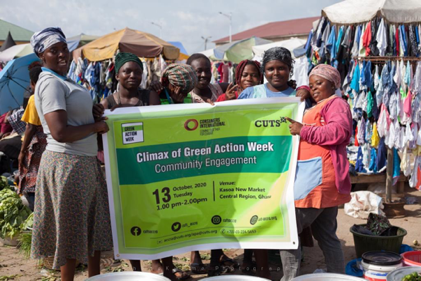As part of activities to climax Green Action Week Campaign 2020, CUTS Ghana, research, consumer protection and public policy think tank with support from Consumer International, has educated market women at Kasoa in the Central Region on innovative measures to reduce the amount of waste they generate at the markets and at home.
In an interaction with the market women on Tuesday, the Country Director of CUTS, Appiah Kusi Adomako said minimizing the amount of waste generated can protect the environment and often turns out to have positive economic benefits. “Minimising or eliminating excessive waste generated makes it easier to meet targets of environmental regulations, policies, and standards. The dire environmental impact of waste we see when it rains can be reduced significantly if we gradually shun the use of plastics,” he said.
“The increasing quantities of waste places high demands on infrastructure and the costs fall mainly upon local and regional authorities. The financial advantage of reducing and recycling waste is enormous. Investing in the prevention of waste is also an effective way of reducing the costs of waste management. Not only do municipalities save money not having to collect as much waste, but the sorting and maintenance of waste disposal facilities would also require fewer resources. In the end, this benefits every Ghanaian both environmentally and financially” he added.
Mr. Adomako explained since women fundamentally manage the home, there was the need to engage them at the local level to adopt more sustainable waste reduction measures to manage the waste they generate on a daily basis. He encouraged them to reduce the amount of plastic shopping bags they give to the shopper.
“If every person who visits the market come with their own basket or reusable paper bag, and buy their goods using it, this will help reduce significantly the amount of plastic bags used, thereby gradually reducing the number of plastic in the system. This will free our gutters, streets and drainage systems from plastics” he added.
A Communication Officer at CUTS, Shadrack Nii Yarboi Yartey encouraged the women to be thoughtful about what they buy and choose a sustainable option whenever possible.
He stressed that they should avoid throwing food away and reduce the consumption of plastics which is one of the main pollutants of our environment.
He reiterated that adopting measures such as carrying a reusable bag each time they shop, refusing to accept plastic bags, and recycling plastic bottles will go a long way to address the sanitation challenges confronting the country.
“Preventing waste does not only lead to environmental benefits but to potentially lower costs since the quantities of waste collected and treated will be smaller. Reducing food loss can contribute to environmental safety. We all have a role to play to ensure that our gutters, streets and drainage systems are rid of waste. There is the need to take action to address this challenge” he added.










